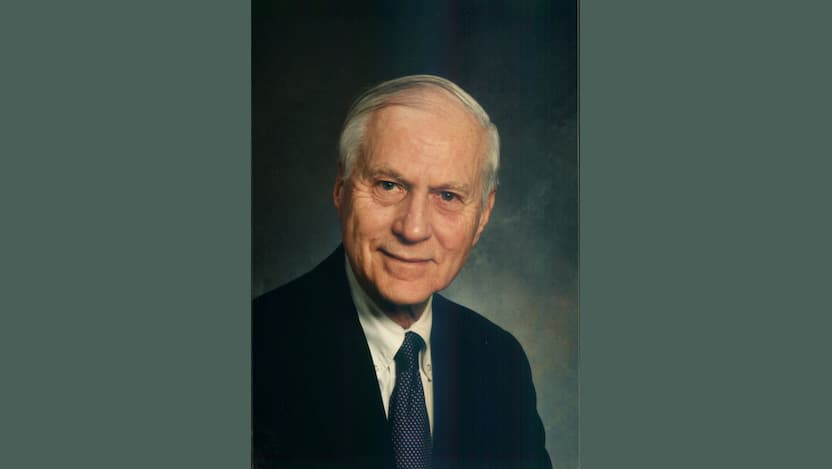Arthur Herbst, MD, ‘brilliant researcher’ and ‘compassionate physician’ in obstetrics and gynecology, 1931-2023

Arthur L. Herbst, MD, who published landmark research showing that a drug administered during pregnancy can cause cancer in the offspring, died June 16 in Chicago. He was 91.
Chair of University of Chicago Medicine's Department of Obstetrics and Gynecology from 1976-2002, Herbst published a paper in the New England Journal of Medicine in 1971 that linked exposure to diethylstilbesterol (DES), a drug once commonly prescribed to prevent miscarriage, to the development of a rare genital tract cancer.
Patients who developed the disease — clear-cell adenocarcinoma of the vagina or cervix — were exposed to the drug in utero. The research was some of the first to highlight the vulnerability of the developing fetus to drugs given to the mother during pregnancy.
“These women were given the drug in good faith by people who believed it would help them,” Herbst said in a 2018 story revisiting the findings. “They took it because they wanted to have a baby and then they find out — 15, 20, 25 years later — that this terrible thing happened.”
The drug was removed from the market a few months after the paper was published. In 1972, Herbst received the Francis Stone Burns Award from the American Cancer Society for this research.
Herbst remained devoted to the women affected by DES throughout his career, creating a registry with more than 700 registered clear-cell adenocarcinoma patients and serving as a repository for their long-term follow-up data. These women had a 20-year survival rate of 69% thanks to close surveillance, early diagnosis and aggressive treatments pioneered by Herbst.
Diane Anderson served as the research project manager for the registry and worked with Herbst for 40 years.
“Dr. Herbst was a very skilled gynecologic oncologist and also a disciplined, detail-oriented researcher,” she said. “He was dedicated to our research study and to providing the most complete and most accurate information possible to patients and physicians who relied on him. He was absolutely beloved by the hundreds of women with clear-cell adenocarcinoma who relied on him for consultation, medical treatment and support.”
Impact at UChicago
Colleagues at UChicago remember Herbst as a brilliant researcher, compassionate physician and skilled administrator who built some of the Midwest’s strongest obstetrics and gynecological oncology sections. He was known as a major supporter of research and a chair who pushed for diversity in medicine throughout his career.
“Dr. Herbst led the department with a steady hand, advancing research and promoting many careers,” said Ernst Lengyel, MD, PhD, Arthur L. and Lee G. Herbst Distinguished Service Professor and current chair of UChicago Medicine's Department of Obstetrics and Gynecology. “He leaves a legacy of creating a department that values research and clinical care while promoting an atmosphere that appreciates differences of opinion and experiences. In the ‘70s, ‘80s and early ‘90s, when no one talked about diversity, he very much supported women and underrepresented minorities in medicine.”
S. Diane Yamada, MD, Joseph Bolivar De Lee Professor of Obstetrics and Gynecology and Section Chief of Gynecologic Oncology, recalled how Herbst came out of retirement to help her take care of oncology patients at a time when she was the sole practicing gynecologic oncologist at the University.
“Dr. Herbst’s greatest legacy was building a department of obstetrics and gynecology that was rooted in a commitment to excellence in research and clinical care,” she said. “He expected excellence from everyone, no one more so than himself.
“He was intensely committed to the DES research and registry he had created and the patients’ families who often reached out to him for advice. And while he could appear steeped in tradition, he could also foresee the need for adaptation in the way clinical care was provided.”
After retiring, Herbst remained invested in the Department of Obstetrics and Gynecology, establishing the Arthur L. Herbst Annual Lectureship in Gynecologic Oncology to support its fellowship program. He also raised money to establish a named, endowed chair at the University, currently held by Lengyel.
Early years and family
Herbst was born September 14, 1931, in New York City. He spent his youth in Pittsburgh, Pennsylvania, where his family moved when he was two.
He earned an undergraduate degree from Harvard University in 1953, where he rowed lightweight crew and graduated magna cum laude in physics. He returned to Harvard for medical school after two years as a line officer in the U.S. Navy. During medical school, he received the Borden Research Award for his work in endocrinology.
Herbst completed an internship and residency in general surgery at Massachusetts General Hospital and a residency in obstetrics and gynecology at Harvard Medical School. His career began as an attending physician at Massachusetts General Hospital and he rose to become an associate professor at Harvard before spending nearly 30 years at the University of Chicago as chair of the Department of Obstetrics and Gynecology.
He served on numerous committees and editorial boards and was elected as a member of the Institute of Medicine and the Royal College of Obstetrics and Gynecology. After retirement, he served as chair of the Visiting Committee of the Department of Science at the University of Arizona.
He is survived by his wife of 64 years, Lee Ginsburg Herbst, children Elizabeth Herbst-Brady (Chris) and Arthur L. Herbst, Jr. (Nicole), and four grandchildren: Marina, Paula, Maggie and Patrick.
A private family service will be held in Boston. In lieu of flowers, the family has requested that you give someone you love a hug.
